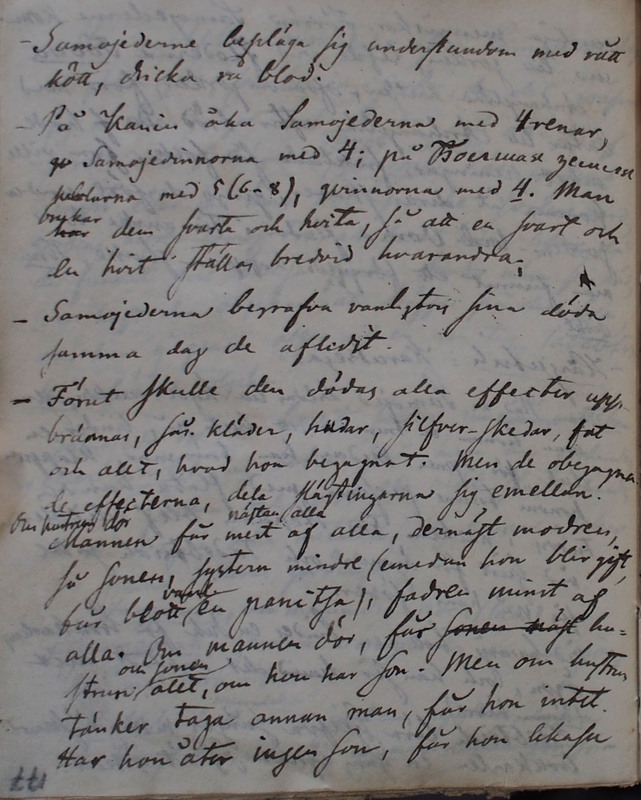Strödda ethnographiska anteckningar. 014
Title
Description
| Samojederne bepläga sig understundom med rått kött, dricka rå blod.
ңайбарць ʻto eat raw reindeer meat’.
|
The Samoyeds sometimes treat themselves to raw meat and drink fresh blood. |
| På
Kanin
åka Samojederna med 4 renar, The number of harnessed reindeer depends on the purpose and season. One needs fewer reindeer during the winter, when the sledges move more lightly on the ice and snow cover. Usually, two reindeer are harnessed to a cargo sledge, two to seven to a lighter riding sledge for faster movement. (Chomič 2018: 157.9)
Samojedinnorna med 4; på Бoлшая земля karlarna med 5 (6-8), qvinnorna med 4. Man brukar den svarta och hvita, så att en svart och en hvit ställas bredvid hvarandra. |
In Kanin the Samoyeds ride with four reindeer, the Samoyed women with four; in Bol'šaja zemlja the men ride with five (six to eight), the women with four reindeer. They usually use one black and one white reindeer harnessed next to each other. |
| Samojederna
begrafva
vanligtvis sina döda See [Den döde].
samma dag de aflidit. |
The Samoyeds usually bury their dead on the same day as they die. |
| Förut skulle den dödas alla effecter upp- brännas, sås[om]. kläder, hudar, silfver-skedar, fat och allt, hvad hon begagnat. Men de obegagna de effecterma. dela slägtningarna sig emellan. |
Formerly, all the deceased’s belongings, such as clothes, hides, silver spoons, dishes, and everything the deceased used, were burnt. But the relatives divide the unused ones among themselves. |
|
Om hustrun
dör Mannen får mest af alla nästan alla, dernäst modren, Ethnographic descriptions contemporary to Castrén describe a similar custom according to which Nenets women who in marriage leave their home camp for their husband’s home come owning personally only their clothes and the resources given by their father. The father’s wealth is inherited by his sons, and if the wife is widowed, she is customarily taken care by the family of her deceased husband. (Efimenko 1877: 180–187; Chomič 1966: 174–175)
så sönen, systern mindre (emedan hon blir gift bär blott vanl[igen]. en panitsa). fadren minst af alla. Om mannen dör, får sonen näst hu- strun och sonen allt, om han har son. Men om hustrun tänker taga annan man, får hon intet. Har hon åter ingen son, får hon likaså |
If a wife dies her husband gets almost everything, then the mother, and then the son, the sister less (because she gets married and usually wears only a panitsa), and the father gets the least of all. If a husband dies, the wife and the son get everything, if he had a son. But if the wife intends to take another man, she gets nothing. If she again does not have a son, she will still get |

